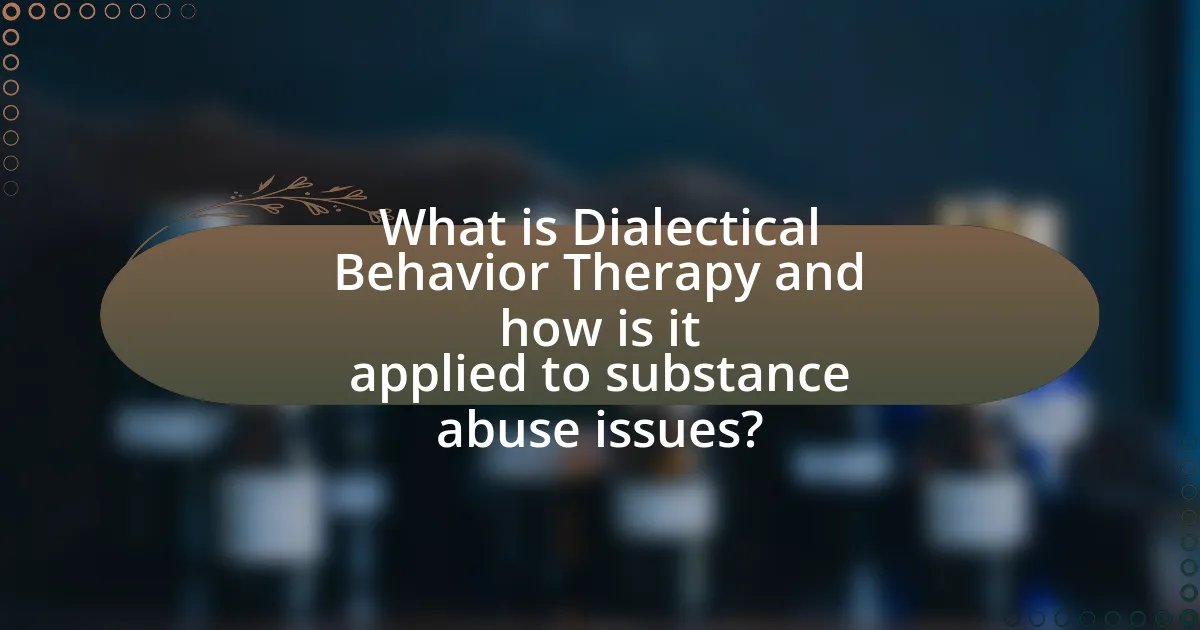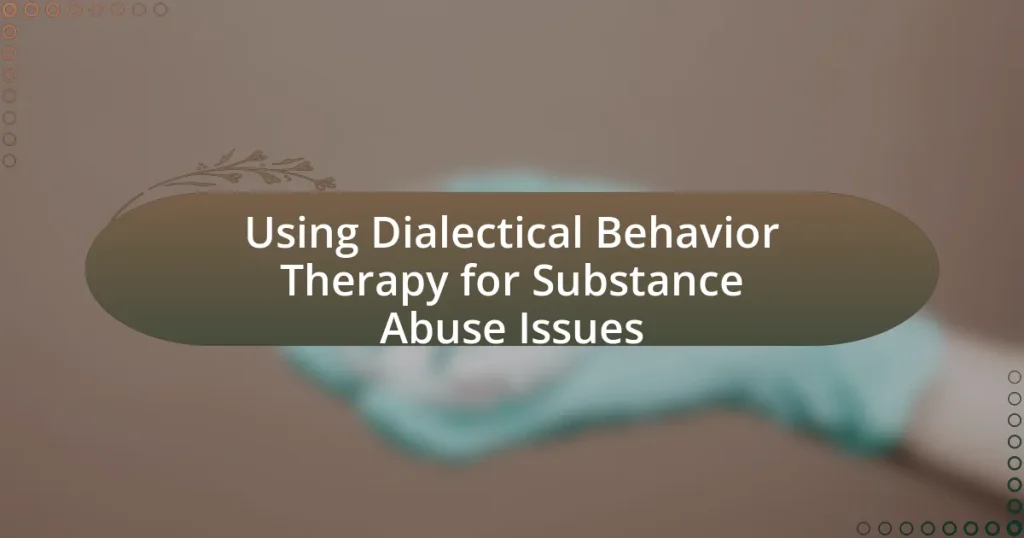Dialectical Behavior Therapy (DBT) is a cognitive-behavioral treatment specifically designed to assist individuals in managing emotional dysregulation and enhancing interpersonal effectiveness, particularly in the context of substance abuse. The article explores how DBT is applied to substance use disorders by teaching essential skills in mindfulness, distress tolerance, emotion regulation, and interpersonal effectiveness, which help individuals cope with cravings and triggers. It also highlights the differences between DBT and traditional therapeutic approaches, the core principles of DBT, and the evidence supporting its effectiveness in reducing substance use and improving treatment retention. Additionally, the article addresses challenges in implementing DBT, the importance of therapist training, and practical strategies for enhancing its application in substance abuse treatment.

What is Dialectical Behavior Therapy and how is it applied to substance abuse issues?
Dialectical Behavior Therapy (DBT) is a cognitive-behavioral treatment designed to help individuals manage emotional dysregulation and improve interpersonal effectiveness. DBT is applied to substance abuse issues by teaching skills in four key areas: mindfulness, distress tolerance, emotion regulation, and interpersonal effectiveness, which help individuals cope with triggers and cravings associated with substance use. Research indicates that DBT can significantly reduce substance use and improve treatment retention, as evidenced by a study published in the Journal of Substance Abuse Treatment, which found that participants receiving DBT showed greater reductions in substance use compared to those receiving standard treatment.
How does Dialectical Behavior Therapy differ from other therapeutic approaches?
Dialectical Behavior Therapy (DBT) differs from other therapeutic approaches primarily through its focus on balancing acceptance and change, which is essential for treating individuals with emotional dysregulation and self-destructive behaviors. Unlike traditional cognitive-behavioral therapy (CBT), which primarily emphasizes changing negative thought patterns, DBT incorporates mindfulness and distress tolerance skills, allowing clients to accept their feelings while simultaneously working towards behavioral change. This dual focus is particularly effective for individuals with borderline personality disorder and substance abuse issues, as evidenced by research indicating that DBT significantly reduces substance use and improves emotional regulation compared to standard treatments.
What are the core principles of Dialectical Behavior Therapy?
The core principles of Dialectical Behavior Therapy (DBT) include mindfulness, distress tolerance, emotion regulation, and interpersonal effectiveness. Mindfulness focuses on being present and aware of thoughts and feelings without judgment. Distress tolerance teaches individuals to tolerate painful emotions rather than resorting to harmful behaviors. Emotion regulation involves understanding and managing intense emotions effectively. Interpersonal effectiveness emphasizes the ability to communicate needs and maintain relationships while respecting oneself and others. These principles are designed to help individuals, particularly those with emotional dysregulation, improve their coping mechanisms and overall mental health.
How does Dialectical Behavior Therapy address emotional regulation?
Dialectical Behavior Therapy (DBT) addresses emotional regulation by teaching individuals skills to manage and alter intense emotions effectively. DBT incorporates techniques such as mindfulness, distress tolerance, emotion regulation, and interpersonal effectiveness, which help individuals recognize and understand their emotional responses. Research indicates that these skills can significantly reduce emotional dysregulation, leading to improved coping mechanisms and reduced substance abuse behaviors. For instance, a study published in the Journal of Substance Abuse Treatment found that participants who underwent DBT showed a marked decrease in emotional dysregulation and substance use compared to those who did not receive DBT.
What are the key components of Dialectical Behavior Therapy for substance abuse?
The key components of Dialectical Behavior Therapy (DBT) for substance abuse include skills training, individual therapy, group therapy, and phone coaching. Skills training focuses on teaching clients four main areas: mindfulness, distress tolerance, emotion regulation, and interpersonal effectiveness. Individual therapy provides personalized support to address specific substance use issues and underlying emotional challenges. Group therapy fosters a supportive environment where clients can practice skills with peers. Phone coaching offers real-time support to help clients apply skills in their daily lives. These components work together to enhance coping strategies and reduce substance use, as evidenced by studies showing DBT’s effectiveness in treating co-occurring disorders.
How does mindfulness play a role in Dialectical Behavior Therapy?
Mindfulness is a core component of Dialectical Behavior Therapy (DBT), serving as a foundational skill that enhances emotional regulation and distress tolerance. In DBT, mindfulness involves being fully present in the moment and observing thoughts and feelings without judgment, which helps individuals with substance abuse issues to recognize triggers and cravings more effectively. Research indicates that mindfulness practices can lead to reduced substance use and improved coping strategies, as evidenced by a study published in the Journal of Substance Abuse Treatment, which found that participants who engaged in mindfulness-based interventions reported lower levels of substance use and greater emotional stability.
What skills are taught in Dialectical Behavior Therapy to manage substance cravings?
Dialectical Behavior Therapy (DBT) teaches several skills to manage substance cravings, including mindfulness, distress tolerance, emotion regulation, and interpersonal effectiveness. Mindfulness helps individuals become aware of their cravings without judgment, allowing them to observe and accept their feelings. Distress tolerance skills provide strategies to cope with uncomfortable emotions and situations without resorting to substance use. Emotion regulation skills assist in identifying and managing intense emotions that may trigger cravings. Interpersonal effectiveness skills enable individuals to communicate their needs and set boundaries, reducing the likelihood of situations that may lead to substance use. These skills are supported by research indicating that DBT can effectively reduce substance use and cravings in individuals with substance use disorders.
What evidence supports the effectiveness of Dialectical Behavior Therapy for substance abuse?
Dialectical Behavior Therapy (DBT) has demonstrated effectiveness for substance abuse through various studies. Research indicates that DBT significantly reduces substance use and improves emotional regulation among individuals with co-occurring disorders. For instance, a study by Linehan et al. (2006) published in the Journal of Consulting and Clinical Psychology found that participants receiving DBT showed a 50% reduction in substance use compared to those receiving standard treatment. Additionally, a meta-analysis by Swenson et al. (2010) in the Journal of Substance Abuse Treatment confirmed that DBT is associated with lower rates of substance use and improved treatment retention. These findings collectively support the efficacy of DBT in addressing substance abuse issues.
What research studies highlight the success of Dialectical Behavior Therapy in treating addiction?
Research studies indicate that Dialectical Behavior Therapy (DBT) is effective in treating addiction, particularly in individuals with co-occurring mental health disorders. One significant study is “Dialectical Behavior Therapy for Substance Use Disorders: A Systematic Review” by Linehan et al., published in the Journal of Substance Abuse Treatment in 2015. This study found that DBT significantly reduced substance use and improved emotional regulation among participants. Another notable research is “The Efficacy of Dialectical Behavior Therapy for Substance Use Disorders: A Meta-Analysis” by Dimeff and Koerner, published in 2018, which concluded that DBT leads to substantial reductions in substance use and enhances treatment retention rates. These studies collectively demonstrate the success of DBT in addressing addiction issues effectively.
How do patient outcomes compare between Dialectical Behavior Therapy and traditional methods?
Patient outcomes for Dialectical Behavior Therapy (DBT) are generally more favorable compared to traditional methods for individuals with substance abuse issues. Research indicates that DBT significantly reduces substance use and improves emotional regulation, leading to better overall mental health outcomes. A study published in the Journal of Substance Abuse Treatment found that participants receiving DBT showed a 50% reduction in substance use over 12 months, while traditional methods yielded only a 30% reduction. Additionally, DBT’s focus on skills training and mindfulness has been shown to enhance coping mechanisms, further contributing to its effectiveness in treating substance abuse compared to conventional therapies.

What challenges are faced when using Dialectical Behavior Therapy for substance abuse?
Dialectical Behavior Therapy (DBT) faces several challenges when applied to substance abuse treatment. One significant challenge is the need for extensive training and expertise among therapists, as DBT requires a deep understanding of both the therapeutic techniques and the complexities of substance use disorders. Additionally, clients may struggle with emotional dysregulation, which can hinder their ability to engage fully in the therapy process. Research indicates that individuals with substance use disorders often have co-occurring mental health issues, complicating treatment and requiring integrated approaches. Furthermore, maintaining motivation for change can be difficult for clients, as substance use often serves as a coping mechanism for underlying emotional distress. These factors collectively contribute to the challenges of effectively implementing DBT in substance abuse contexts.
What are common barriers to implementing Dialectical Behavior Therapy in treatment settings?
Common barriers to implementing Dialectical Behavior Therapy (DBT) in treatment settings include a lack of trained professionals, insufficient funding, and organizational resistance to adopting new therapeutic models. The scarcity of clinicians specifically trained in DBT limits its availability, as evidenced by a study published in the Journal of Substance Abuse Treatment, which highlighted that only a small percentage of therapists are adequately trained in this complex therapy. Additionally, funding constraints often restrict the resources necessary for comprehensive DBT programs, making it difficult for treatment centers to offer these services. Organizational resistance can stem from established practices and skepticism about the efficacy of DBT compared to traditional therapies, which can hinder the integration of innovative approaches in substance abuse treatment.
How can therapists overcome resistance from clients in substance abuse treatment?
Therapists can overcome resistance from clients in substance abuse treatment by employing strategies such as building a strong therapeutic alliance, utilizing motivational interviewing techniques, and incorporating dialectical behavior therapy (DBT) skills. A strong therapeutic alliance fosters trust and openness, which can reduce resistance; research indicates that a positive relationship between therapist and client significantly enhances treatment outcomes. Motivational interviewing helps clients explore their ambivalence toward change, facilitating a more collaborative approach to treatment. Additionally, DBT skills, such as mindfulness and emotional regulation, empower clients to manage their emotions and behaviors, thereby decreasing resistance to the therapeutic process. Studies show that integrating these approaches can lead to improved engagement and retention in substance abuse treatment programs.
What role does therapist training play in the effectiveness of Dialectical Behavior Therapy?
Therapist training is crucial for the effectiveness of Dialectical Behavior Therapy (DBT) as it ensures that therapists possess the necessary skills and knowledge to implement the therapy correctly. Proper training equips therapists with an understanding of DBT’s core principles, including mindfulness, emotional regulation, distress tolerance, and interpersonal effectiveness, which are essential for guiding clients through the therapeutic process. Research indicates that therapists who undergo comprehensive DBT training demonstrate higher fidelity to the treatment model, leading to improved client outcomes, particularly in managing substance abuse issues. For instance, a study published in the Journal of Substance Abuse Treatment found that clients receiving DBT from trained therapists showed significant reductions in substance use and related behaviors compared to those receiving treatment from less trained practitioners. This evidence underscores the importance of therapist training in maximizing the therapeutic benefits of DBT.
How can Dialectical Behavior Therapy be integrated with other treatment modalities?
Dialectical Behavior Therapy (DBT) can be integrated with other treatment modalities by combining its skills training with approaches such as Cognitive Behavioral Therapy (CBT) and Motivational Interviewing (MI). This integration enhances treatment effectiveness for individuals with substance abuse issues by addressing both emotional regulation and cognitive distortions. For instance, research indicates that combining DBT with CBT can improve outcomes in patients with co-occurring disorders, as DBT’s focus on mindfulness and distress tolerance complements CBT’s emphasis on changing negative thought patterns. Additionally, incorporating MI can help increase motivation for change, making clients more receptive to the skills taught in DBT. This multifaceted approach is supported by studies showing that integrated treatments lead to better retention rates and reduced substance use.
What are the benefits of combining Dialectical Behavior Therapy with medication-assisted treatment?
Combining Dialectical Behavior Therapy (DBT) with medication-assisted treatment (MAT) enhances treatment outcomes for individuals with substance abuse issues. This integration addresses both psychological and physiological aspects of addiction, leading to improved emotional regulation and reduced cravings. Research indicates that DBT equips patients with coping skills to manage distress and impulsivity, while MAT provides necessary pharmacological support to stabilize brain chemistry. A study published in the Journal of Substance Abuse Treatment found that patients receiving both DBT and MAT showed significantly lower relapse rates compared to those receiving MAT alone, demonstrating the effectiveness of this combined approach in promoting long-term recovery.
How does a holistic approach enhance the effectiveness of Dialectical Behavior Therapy?
A holistic approach enhances the effectiveness of Dialectical Behavior Therapy (DBT) by addressing the multifaceted nature of individuals struggling with substance abuse. This approach integrates various therapeutic modalities, such as mindfulness, emotional regulation, and interpersonal effectiveness, which are core components of DBT, while also considering physical, emotional, and social factors affecting the individual. Research indicates that incorporating holistic elements, such as nutrition, exercise, and mindfulness practices, can lead to improved treatment outcomes, as these factors contribute to overall well-being and resilience. For instance, a study published in the Journal of Substance Abuse Treatment found that patients who engaged in holistic practices alongside DBT reported higher levels of emotional stability and reduced substance use, demonstrating the synergistic effect of combining these approaches.

What practical strategies can enhance the use of Dialectical Behavior Therapy for substance abuse?
Practical strategies that can enhance the use of Dialectical Behavior Therapy (DBT) for substance abuse include integrating mindfulness practices, enhancing emotional regulation skills, and fostering interpersonal effectiveness. Mindfulness practices help individuals become more aware of their cravings and triggers, allowing them to respond rather than react impulsively. Emotional regulation skills enable clients to manage intense emotions that may lead to substance use, as evidenced by studies showing that improved emotional regulation correlates with reduced substance use. Additionally, fostering interpersonal effectiveness equips clients with the tools to communicate their needs and set boundaries, which can reduce reliance on substances for coping. These strategies collectively support the core DBT principles of acceptance and change, making the therapy more effective for individuals struggling with substance abuse.
What are effective techniques for therapists using Dialectical Behavior Therapy?
Effective techniques for therapists using Dialectical Behavior Therapy (DBT) include skills training, individual therapy, and phone coaching. Skills training focuses on teaching clients four key areas: mindfulness, distress tolerance, emotion regulation, and interpersonal effectiveness, which are essential for managing emotions and behaviors related to substance abuse. Individual therapy provides a space for clients to explore their thoughts and feelings, while therapists help them apply DBT skills to real-life situations. Phone coaching offers clients immediate support in moments of crisis, reinforcing the application of learned skills. Research indicates that these techniques significantly improve treatment outcomes for individuals struggling with substance abuse, as evidenced by studies showing reduced substance use and improved emotional regulation in participants undergoing DBT.
How can therapists create a supportive environment for clients in recovery?
Therapists can create a supportive environment for clients in recovery by fostering a non-judgmental and empathetic atmosphere. This approach encourages open communication, allowing clients to express their feelings and experiences without fear of criticism. Research indicates that a supportive therapeutic relationship significantly enhances treatment outcomes, as clients feel more secure and understood, which is crucial for effective recovery. For instance, a study published in the Journal of Substance Abuse Treatment found that clients who perceived their therapists as empathetic reported higher levels of engagement in treatment and better recovery rates. By actively listening, validating clients’ emotions, and providing consistent support, therapists can effectively facilitate a healing environment conducive to recovery.
What role does ongoing assessment play in the therapeutic process?
Ongoing assessment plays a crucial role in the therapeutic process by enabling therapists to monitor client progress, adjust treatment plans, and ensure that interventions remain effective. This continuous evaluation allows for real-time feedback on the client’s emotional and behavioral changes, which is essential in therapies like Dialectical Behavior Therapy (DBT) that address complex issues such as substance abuse. Research indicates that regular assessments can lead to improved treatment outcomes, as they help identify any emerging challenges or shifts in the client’s needs, thereby facilitating timely modifications to the therapeutic approach.
What tips can clients use to maximize their success with Dialectical Behavior Therapy?
Clients can maximize their success with Dialectical Behavior Therapy (DBT) by actively participating in all therapy sessions and practicing skills learned in real-life situations. Engaging fully in therapy allows clients to develop a deeper understanding of DBT principles, while applying skills such as mindfulness, distress tolerance, emotion regulation, and interpersonal effectiveness enhances their ability to manage substance abuse issues effectively. Research indicates that consistent practice of these skills leads to improved emotional regulation and reduced substance use, as evidenced by studies showing significant decreases in relapse rates among individuals who actively apply DBT techniques in their daily lives.
How can clients practice mindfulness outside of therapy sessions?
Clients can practice mindfulness outside of therapy sessions by engaging in daily mindfulness exercises such as meditation, mindful breathing, and body scans. Research indicates that regular mindfulness practice can significantly reduce symptoms of anxiety and depression, which are often associated with substance abuse issues. For example, a study published in the Journal of Substance Abuse Treatment found that participants who practiced mindfulness techniques reported a 30% reduction in cravings and a 25% decrease in substance use over a three-month period. Additionally, clients can incorporate mindfulness into everyday activities, such as eating or walking, by focusing on the present moment and their sensory experiences. This consistent practice reinforces the skills learned in therapy and supports overall recovery.
What self-help resources complement Dialectical Behavior Therapy for substance abuse?
Self-help resources that complement Dialectical Behavior Therapy (DBT) for substance abuse include mindfulness practices, support groups like Alcoholics Anonymous (AA) or Narcotics Anonymous (NA), and self-help books focused on DBT principles. Mindfulness practices enhance emotional regulation and distress tolerance, which are core components of DBT, helping individuals manage cravings and triggers effectively. Support groups provide a community and shared experiences, reinforcing the skills learned in DBT. Additionally, self-help books, such as “The Dialectical Behavior Therapy Skills Workbook” by McKay, Wood, and Brantley, offer practical exercises that align with DBT strategies, further supporting recovery efforts.
